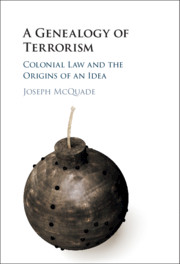Book contents
- A Genealogy of Terrorism
- A Genealogy of Terrorism
- Copyright page
- Dedication
- Epigraph
- Contents
- Figures
- Acknowledgements
- Abbreviations
- Introduction
- 1 Ethereal Assassins
- 2 ‘The Magical Lore of Bengal’
- 3 ‘The Eye of Government Is on Them’
- 4 Indefinite Emergency
- 5 Terrorism as a ‘World Crime’
- Conclusion
- Glossary
- Select Bibliography
- Index
4 - Indefinite Emergency
Revolutionary Politics and ‘Terrorism’ in Interwar India
Published online by Cambridge University Press: 30 October 2020
- A Genealogy of Terrorism
- A Genealogy of Terrorism
- Copyright page
- Dedication
- Epigraph
- Contents
- Figures
- Acknowledgements
- Abbreviations
- Introduction
- 1 Ethereal Assassins
- 2 ‘The Magical Lore of Bengal’
- 3 ‘The Eye of Government Is on Them’
- 4 Indefinite Emergency
- 5 Terrorism as a ‘World Crime’
- Conclusion
- Glossary
- Select Bibliography
- Index
Summary
The interwar period in India was a time of great political upheaval, with the development of unprecedented mass support for the politics of anti-colonial nationalism. This period also marked the climax of the revolutionary movement in Bengal, as radicals disenchanted by the failure of the non-cooperation campaign soon returned to the tactics of assassination and political violence that they adopted before and during the war. In 1925, the return of revolutionary organizations prompted the Government of India to introduce the Bengal Criminal Law Amendment Act, despite vigorous opposition from within the newly expanded Indian legislatures. With political violence reaching unprecedented levels in the early 1930s, colonial officials became increasingly reliant on repressive emergency laws that for the first time began to target ‘terrorism’ as a distinct category of crime.
Keywords
- Type
- Chapter
- Information
- A Genealogy of TerrorismColonial Law and the Origins of an Idea, pp. 163 - 203Publisher: Cambridge University PressPrint publication year: 2020

